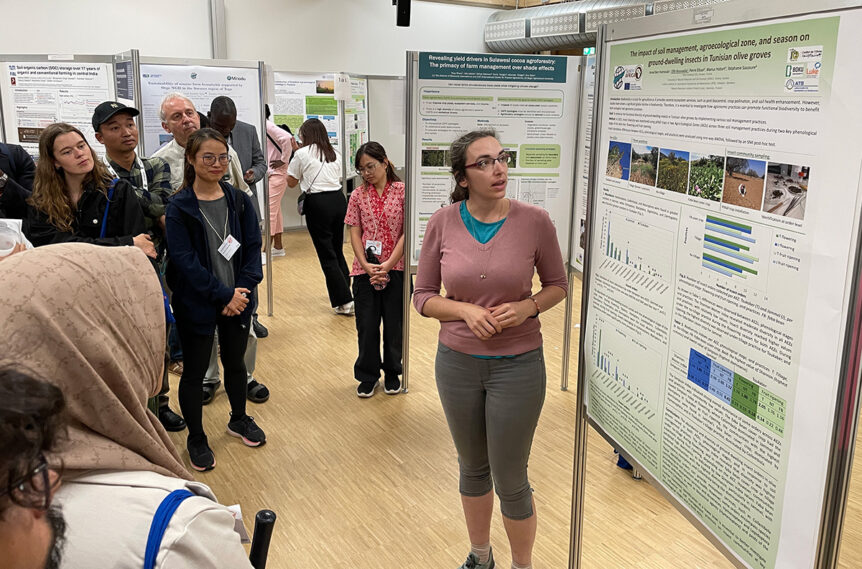We are delighted to share the exciting developments from our participation at the Tropentag Conference 2024 in Vienna, Austria. Our team presented six innovative scientific posters, each stemming from the extensive research conducted under the Horizon 2020 project SustInAfrica, funded by the European Union. Here’s a closer look at the work our researchers showcased.






1. Decomposition Dynamics: Evaluating Ecosystem Services in African Agroecosystems
Helena Serrano presented on the critical role of decomposition in evaluating ecosystem services within African agroecosystems. Her research highlights how different agricultural practices influence the nutrient and carbon cycles. By employing the teabag method, Helena’s team demonstrated how biodiversity and microclimate affect decomposition rates in various crops, such as cereals, maize, and agroforestry systems. The findings emphasize the importance of understanding human impacts on these natural processes to ensure sustainable farming practices.
2. Food Insecurity and Ecosystem Services: A Complex Interplay
Gregory Aryee presented on the intricate relationship between food insecurity and ecosystem services (ES) in Africa. His conceptual framework examines how drivers of food insecurity and ecosystem change interact, revealing the trade-offs associated with agricultural intensification. Gregory’s presentation highlighted strategies like climate-smart agriculture and sustainable land management, and explored the potential of Payment for Ecosystem Services (PES) to incentivize sustainable practices. This research calls for integrated solutions to address food security and ecosystem sustainability.
3. Enhancing Soil Health: A Comprehensive Approach to Fertilizer Management
Pierre Ellssel presented on optimizing soil health through a holistic approach to fertilizer management in Africa. His research explores the potential of organic inputs produced from off-farm organic waste streams, such as compost and biofertilizers, alongside strategic inorganic fertilizer application. By investigating these practices across 12 African countries, Pierre’s team highlighted the importance of reconnecting carbon inputs with nutrients to enhance soil productivity. This comprehensive approach offers valuable insights for improving soil health and sustainability in agricultural systems.
4. Biodiversity Boost: Soil Management and Insect Diversity in Tunisian Olive Groves
Amel Ben Hamouda and Stephanie Saussure presented on the effects of different soil management practices on ground-dwelling insects in Tunisian olive groves. Their research compared no-tillage, Faba bean cover crop, and traditional tillage practices across two agroecological zones and seasons. The results showed that no-tillage and cover crop practices significantly increased insect diversity and abundance, highlighting the benefits of nature-friendly soil management. This study underscores the importance of preserving biodiversity in agricultural landscapes.
5. Agroecological Transition: Sustainable Practices in Tunisian Olive Farms
Olfa Boussadia presented on the agroecological transition of rainfed Tunisian olive groves through no-tillage and cover crop practices. Her research examined the impact of these practices on soil properties, olive tree nutrition, and olive yield. The findings revealed that no-tillage and leguminous cover crops improved soil organic matter and nitrogen content, leading to increased olive productivity. Olfa’s presentation demonstrated that thoughtful soil management can enhance both soil fertility and crop yields, contributing to more sustainable farming systems.
6. Precision Agriculture: Drone-Based Monitoring in Olive Orchards
Marius Hobart presented on the use of drone technology to estimate leaf chlorophyll and nitrogen content in olive orchards using low-budget RGB imagery. His team’s field study created spectral indices from drone images to model the SPAD value, an indirect measure of chlorophyll content. The research showed that this method could accurately estimate chlorophyll levels, offering a cost-effective and efficient tool for precision agriculture. Marius’s presentation highlighted the potential of drone-based monitoring to enhance crop management and sustainability.
Our team’s presentations at the Tropentag Conference 2024 showcased the innovative research and practical solutions we are developing to address the challenges faced by African agroecosystems. We are content to contribute to the global dialogue on sustainable agriculture and ecosystem services, and we look forward to continuing our journey of discovery and impact. Stay tuned for more updates and insights from our ongoing research!

